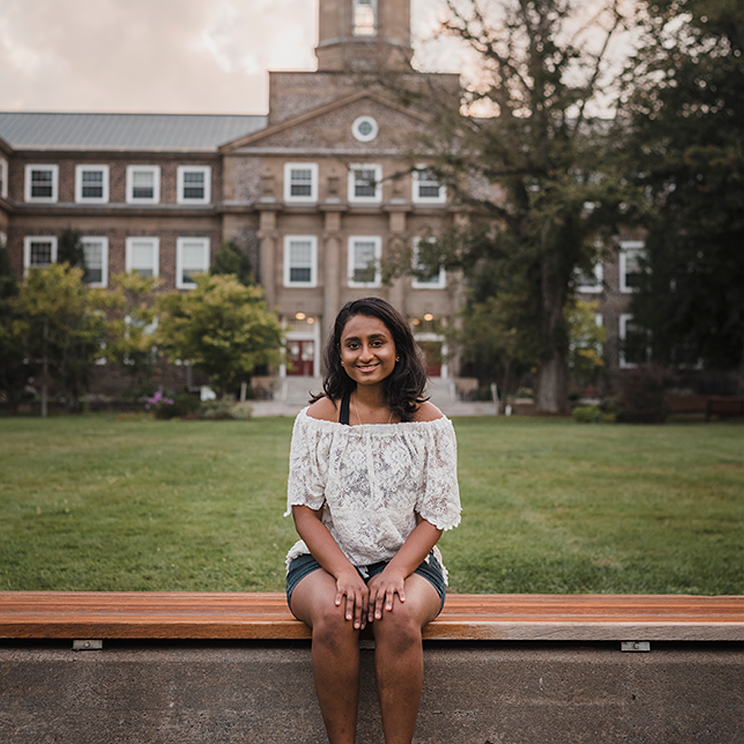How much of a sick joke did your day planner feel like by mid-2020? Time was an endless slip-and-slide of zoom meetings while the campus bubble—which can already feel small—shrunk to the size of your computer screen. It wasn't an easy year for anyone, students included. But just as the pandemic might be making its way out of what we know to be the physically distant world of today, students are in for a treat as they say goodbye to the days of pyjamas and pre-recorded lectures. They can now scream hello to a campus flooded with students rushing from Tim Hortons to tutorials. In-person learning is on the horizon, but with it comes a great deal of uncertainty.
Aidan Bonner, now a second-year commerce student at Dalhousie University, spent his entire first year within the four walls of his dorm room. Between watching lectures and writing his final exams in residence, every Thursday felt like a carbon copy of every Wednesday. "It was extremely dreadful and just toxic for a lot," he says. Alongside most of the class of 2024, he finished a quarter of his undergraduate degree without having ever seen the inside of a lecture hall.
But despite there being excitement around in-person classes, when adjustment knocks, for many, so does anxiety. The debut of what many would consider a "normal" post-secondary year comes with a cost: learning to adapt, stay calm and above all, remain empathetic.
"I think a lot of people, myself included, will have those moments of 'where am I, is this the right building, is this the right room?'" says Bonner. "I hope that professors and just faculty in general are able to realize that they're not only dealing with one new class at Dalhousie, they're really dealing with two."
For these two new classes, there are two distinct layers of nervousness. Manager of the Counselling Centre at Saint Mary's University Brian MacAulay says "Coming to university for the first time, especially if you're leaving your home community, home province or even home country, can be scary and this is sometimes the first time people really feel alone."
"It's entirely normal for people to be feeling anxious and nervous about returning to in-person learning," says MacAulay. "COVID isn't just COVID, it's also consistent change."
"I think we are worried because our norm of university this year was online," says Bonner.
While writing exams 50 feet from the kitchen table became second nature, so did graduating from high school in the living room and receiving a university degree from Canada Post. Aparna Mohan, the Interim Vice-President Academic and External on the Dalhousie Student Union (DSU), underscores that any form of change comes with the need for patience.
"I think that one of the things that the pandemic has done through the various ways that it has disrupted life and society as we know it, is to open up our minds to some of the inequities that exist within society," she says. "Even if there are people out there that are suffering or have suffered more than you have, your feelings of loss are valid, your feelings of grief are valid and it's okay, it's healthy to grieve whatever it was you felt you lost."
The DSU has been taking the time to ensure that student resources are being continuously shared and they have updated their website in the process. Knowing help is available is important, but understanding how to access it is more pressing.
While the entire class of 2024 was separated this year, the need for a sense of community had never been more sought out.
Bonner founded the Happy Human Project, an organization whose objective is to build a community to support student wellness. Mindful of the anxieties that will come with the upcoming semester, this community is a reminder to all that when students work and grow together, they can find comfort in connectivity. "You aren't alone feeling this self-anxiety, we all endured this pandemic together," he adds.
"Anxiety and stress is a sign that maybe something's wrong, that we might want to check in with ourselves to see why we're feeling these things," MacAulay says. For those who are feeling overwhelmed, your emotions are legitimate and seeking professional attention might be worth a try. According to MacAulay, "Coming in and talking to somebody is about sort of dissecting how these things are affecting you and also why they're affecting you."
This year, similar to the last, will be another journey in which students can expect to be surprised by different hurdles thrown their way. Mohan notes students have a chance to compose a new narrative to "embrace the new opportunities to rebuild community, to redefine the university experiences."
Throughout this redefinition, however, it is vital to remember that asking for help is a testament to a person's strength, not their weakness. "I don't believe it matters—race, creed, socio-economic status, place of residence—at some point every single person should probably access mental health support, just like we access our family doctors," says MacAulay. "Change is hard at the best of times," he adds, "and right now, it's really hard." a

